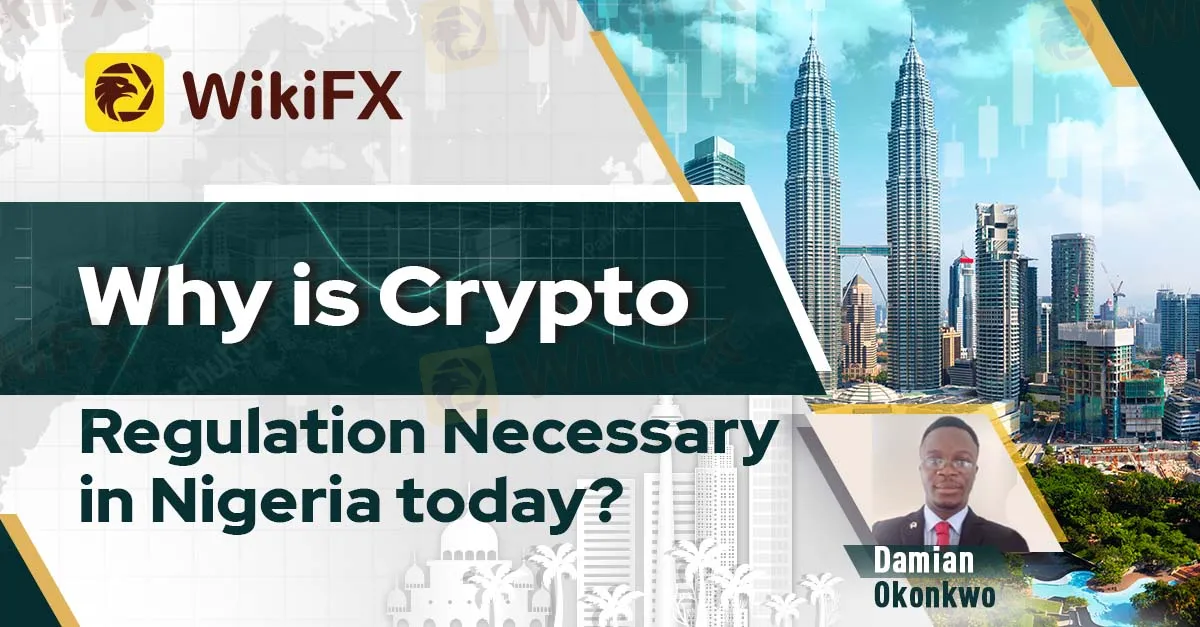简体中文
繁體中文
English
Pусский
日本語
ภาษาไทย
Tiếng Việt
Bahasa Indonesia
Español
हिन्दी
Filippiiniläinen
Français
Deutsch
Português
Türkçe
한국어
العربية
Why is Crypto Regulation Necessary in Nigeria today?
Abstract:Nigeria needs a comprehensive regulatory framework that addresses all aspects of the cryptocurrency market. This framework should be designed to protect investors from fraud and cyber attacks.

By: Damian Okonkwo

Introduction
Nigeria boasts one of the most vibrant and active cryptocurrency ecosystems in the world. Despite the lack of formal recognition by the Central Bank of Nigeria (CBN), Nigerians have embraced cryptocurrencies as a hedge against inflation, a conduit for remittances, and a gateway to global markets. However, this burgeoning sector currently operates in a regulatory grey area. This lack of clarity presents significant risks for investors and hinders the industry's potential to contribute meaningfully to the Nigerian economy.
Why Crypto Regulation is Necessary in Nigeria Today
There are several compelling arguments for why crypto regulation is necessary in Nigeria today:
1. Investor Protection: The volatile nature of cryptocurrencies and the prevalence of scams expose investors to significant financial risks. A regulatory framework would require exchanges to comply with anti-money laundering (AML) and Know Your Customer (KYC) protocols, protecting investors from fraudulent activities and ensuring transparency in the market.
2. Financial Stability: The widespread use of cryptocurrencies could pose risks to the stability of the Nigerian financial system. Cryptocurrencies are not currently subject to any regulatory oversight, which could lead to their use for illicit activities or financial instability. Regulation would enable authorities to monitor the market and mitigate these risks.
3. Fostering Innovation: A clear and well-defined regulatory framework can provide a stable environment for the cryptocurrency industry to thrive. This would attract investment, encourage innovation, and create new jobs in the Nigerian economy.
4. Promoting Tax Compliance: The current lack of regulation makes it difficult for the government to collect taxes on cryptocurrency transactions. A regulatory framework would bring cryptocurrencies within the tax net, generating additional revenue for the government.
5. Combating Financial Crimes: Cryptocurrencies have been associated with various financial crimes, including money laundering, terrorism financing, and tax evasion. Regulation would enable authorities to track and deter such activities, making Nigeria's financial system less susceptible to criminal activity.
The Regulatory Landscape
In May 2022, the Securities and Exchange Commission (SEC) issued a set of regulations for digital assets, including cryptocurrencies. This was a positive step towards creating a regulatory framework for the industry. However, the SEC's regulations only apply to the initial issuance and sale of digital assets, leaving other aspects of the market unregulated.
The Way Forward
Nigeria needs a comprehensive regulatory framework that addresses all aspects of the cryptocurrency market. This framework should be designed to:
● Protect crypto investors from fraud and cyber attacks.
● Maintain the stability of the financial system.
● Foster innovation and growth in the industry.
● Promote tax compliance.
● Combat financial crimes.
Conclusion
Cryptocurrency regulation is not a matter of “if” but “when.” The Nigerian government must act now to implement a well-designed regulatory framework that fosters a vibrant and responsible cryptocurrency ecosystem. This framework will not only protect investors and maintain financial stability but also unlock the full potential of cryptocurrencies to contribute to the Nigerian economy.

Disclaimer:
The views in this article only represent the author's personal views, and do not constitute investment advice on this platform. This platform does not guarantee the accuracy, completeness and timeliness of the information in the article, and will not be liable for any loss caused by the use of or reliance on the information in the article.
Read more

Bybit Shuts Down NFT Marketplace Amid Crypto Market Downturn
Bybit announces the closure of its NFT marketplace, citing efforts to streamline offerings. Discover the latest trends in the declining NFT market and its shift to utility-based growth.

Galaxy Digital Settles $200M in Luna Token Manipulation Case
Galaxy Digital pays $200M to settle Luna token manipulation probe by NY regulators, linked to TerraUSD’s 2022 crash, impacting crypto market stability.

Vanuatu Passes VASP Act to Regulate Crypto and Digital Assets
Vanuatu's new VASP Act regulates crypto businesses, enforcing strict licensing, AML/CFT compliance, and investor protections.

Why the SEC Rejected the First U.S. Bank-Issued Stablecoin
The SEC rejected the first U.S. bank-issued stablecoin, citing regulatory concerns. This decision highlights the ongoing challenges in crypto asset classification and oversight.
WikiFX Broker
Latest News
The Withdrawal Trap: How Scam Brokers Lure Victims into Paying More
FCA to Investors: Think Twice Before Trusting These Brokers
Trump\s tariffs: How could they affect the UK and your money
Trump gambles it all on global tariffs he\s wanted for decades
TradingView Brings Live Market Charts to Telegram Users with New Mini App
Trump tariffs: How will India navigate a world on the brink of a trade war?
Interactive Brokers Launches Forecast Contracts in Canada for Market Predictions
Authorities Alert: MAS Impersonation Scam Hits Singapore
IG Group Acquires Freetrade for £160M to Expand UK Investment Market
U.S. March ISM Manufacturing PMI Released
Currency Calculator







